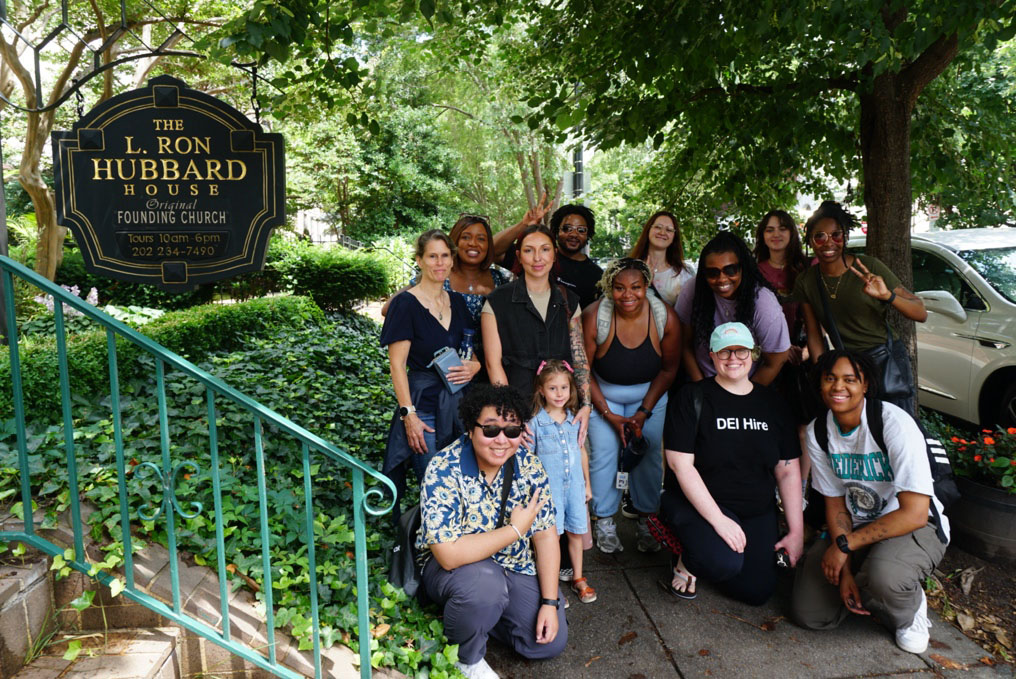
A budding psychologist, Ines Agopome decided to take a summer course that would help her better understand why people fall for cults and conspiracies.
In the end, she was surprised at what she would learn: Anyone is vulnerable.
At a time when conspiracies and cult-like behavior are increasingly discussed, two UBalt educators set out help UBalt students to recognize and respond to any misinformation and manipulations that could put them at risk.
The idea for Cults, Conspiracies and Crises came from Chris Ceary, M.S. ’17, a counseling psychology alum and adjunct professor that Dr. Sally Farley invited to pitch a summer class. They co-taught the unique psychology course that drew students from across several academic programs.
“It feels like preparing our students to enter the world with critical thinking to avoid significant traps that exist in our current culture,” Ceary said. “It is media literacy training turned up to 11, if you will.”
One unforgettable moment for Agopome, a B.A. in Psychology student, happened during a class trip to Washington, D.C. The students toured the International Spy Museum and the L. Ron Hubbard Museum House, the founding church of scientology.
At the Hubbard Museum, a tour guide shared her own account about being drawn into scientology without fully understanding the attraction.
That lack of explanation troubled Agopome, who was used to rooting decisions in data and logic. She was learning in the class that cults lure more than the naïve and weak-minded, and here was proof.
“We hope that everyone has a core village or support system, however, for those who don’t—and who long for the same acceptance and support—they may try to search for it wherever it feels right,” she said.
The students weren’t the only ones to learn from the course.
In building out the class structure, Ceary watched more than a dozen documentaries and read several books about cults. One book that stood out was Cultish: The Language of Fanaticism―Understanding the Social Science of Cult Influence by Amanda Montell. They assigned students to read it, too, because it highlighted how language used in cults mirrors conversations in the world at-large.
In her own research, Farley started identifying parallels the manipulation tactics of predatory cult leaders and controlling relationship partners. She was also fascinated to learn the traits of people drawn to cults.
They took what stood out to them and mapped a curriculum that involved the museum visits (funded through the Helen P. Denit Honors Program and visit from Stephen Jones, son of Jim Jones, an American cult leader who orchestrated a mass murder-suicide of his founded group, the Peoples Temple, in 1978.
Lesson by lesson, their students came to see cults and conspiracies in a new light.
“I've started to look closely at how my own need for belonging and clarity has, in the past, lured me toward certain ideologies or belief systems that are somewhat rigid,” Erin Jones, a B.A. in Psychology student, said. “While I wouldn't call them cultic, I now see how anyone could be led to such a thing when stressed, disoriented and hungry for meaning.”
Agopome said the class helped her see the possible dangers hiding in plain sight. Passions, she learned, can sometimes become cultish when they descend from hobby to obsession.
“Knowing this information helps me better understand future patients, as they may be in these groups without even realizing the potential harm. It’s up to me to help them navigate these toxic and abusive dynamics and hopefully come out on the other side without feeling like they’ve lost the support and village they were searching for in the first place,” she said.
Agopome also plans to be more cautious of underlying intentions in her own spaces.
Bria Howard, a B.S. in Forensic Studies student, felt similar surprise about how easily anyone can find themselves in a cult.
“Multiple groups are not outright obvious in their cult nature. … The differentiating factor is when there is an element of unchecked leadership or an extreme force of control over your life,” she said.
Howard acknowledged it can be easy to fall into what feels comfortable or believe what you think you want to hear, but that it’s important to proceed with educated caution.
She pointed to the connections between cults and abusive situations. It may start with love and affection but slips quickly into bouts of gaslighting, manipulation and isolation.
“Once the isolation takes hold, the threats become more prevalent and actualized. Fear tactics are used in both domestic violence situations and cults to keep the members from escaping.”
These concepts and other theories that she learned during the class have helped Howard determine how she might approach conversations with others who might be wrapped up in cultish behavior.
As a psychology student, Jones appreciated learning about a technique aimed at helping people exit cults called motivational interviewing.
“Often, the process starts with a gentle question like, ‘What first drew you to this group?’ or, ‘Have you ever had doubts about what you've been told?’ rather than with the accusatory or ridiculing questions that some people use,” she said.
Approaching conversations with empathy has also helped Jones talk to family members espousing conspiracy theories as fact.
“Now, I try to ask questions that elicit more of their thought process and help me understand their perspective,” she said. “I don’t do it perfectly or with every family member, but I’ve found that when I respond with curiosity, the conversation can lead us both to a place that’s a little closer to the middle.”
Agopome’s takeaway was understanding how much empathy matters.
“Everyone just wants to be in a community where they feel comfortable, seen, respected and valued,” she said. “This being said, as a people we need to be nicer and more accepting of each other. The feeling of security and community is a basic human need. It shouldn’t be as hard as it is for us to find it.”

